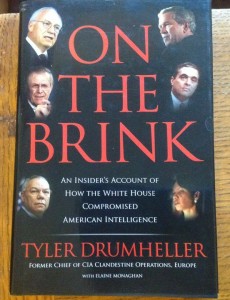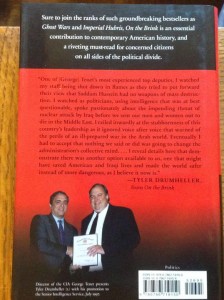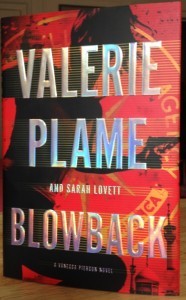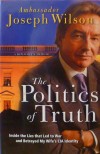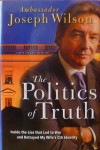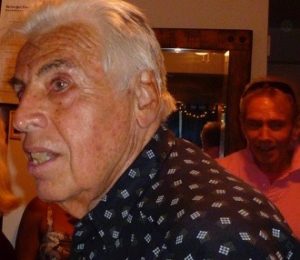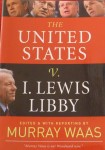RIP Ambassador Joseph Wilson—Proud Progressive Patriot and Friend to Many
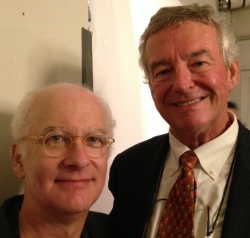 One of my most treasured authors whom I cherished working with across three decades as an in-house acquiring editor for publishing houses was Ambassador Joseph Wilson, who died today in Santa Fe, NM, age 69. When Joe was on book tour for his 2004 bestseller THE POLITICS OF TRUTH–A Diplomat’s Memoir: Inside the Lies that Led to War and Betrayed My Wife’s CIA Identity (Carroll & Graf Publishers), he really enjoyed giving public talks, especially to students and faculty on college campuses. He would tell stories from his career as a 25-year US Foreign Service officer, with pinpoint memories of the countries he worked in, including in Niger and Iraq, which had so much topical relevance then, after America’s invasion of Iraq was based in part on the false claim that Saddam Hussein had sought uranium in the landlocked African country. Joe extolled having a career in foreign service, and all but recruited people to go take the State Dept’s Foreign Service exam. Of course, he also discussed what from his perspective had happened in the run-up to the tragic invasion of Iraq in March 2003. Notwithstanding the war we were entangled in, he espoused an uplifting message, a proud progressive patriotism that was a counterweight to the jingoism of his critics. Audiences found his talks very inspiring.
One of my most treasured authors whom I cherished working with across three decades as an in-house acquiring editor for publishing houses was Ambassador Joseph Wilson, who died today in Santa Fe, NM, age 69. When Joe was on book tour for his 2004 bestseller THE POLITICS OF TRUTH–A Diplomat’s Memoir: Inside the Lies that Led to War and Betrayed My Wife’s CIA Identity (Carroll & Graf Publishers), he really enjoyed giving public talks, especially to students and faculty on college campuses. He would tell stories from his career as a 25-year US Foreign Service officer, with pinpoint memories of the countries he worked in, including in Niger and Iraq, which had so much topical relevance then, after America’s invasion of Iraq was based in part on the false claim that Saddam Hussein had sought uranium in the landlocked African country. Joe extolled having a career in foreign service, and all but recruited people to go take the State Dept’s Foreign Service exam. Of course, he also discussed what from his perspective had happened in the run-up to the tragic invasion of Iraq in March 2003. Notwithstanding the war we were entangled in, he espoused an uplifting message, a proud progressive patriotism that was a counterweight to the jingoism of his critics. Audiences found his talks very inspiring.
On MSNBC this afternoon, at the end of “Deadline White House,” host Nicole Wallace lowered her voice in respect, and offered a tribute to Joe. Relevantly, you’ll recall she had worked in the George W Bush White House. She began a little sheepishly, a nod I think to the fact that administration colleagues of hers—Dick Cheney, Karl Rove, and Scooter Libby—had been in on the targeting of Joe and his wife Valerie Plame*. Nonetheless, through some surprising circumstances she didn’t specify, she said that she and Joe had become friends at some point. (She didn’t say exactly when.) Turns out, that like me over this past summer, Wallace told her audience that she’d heard from Joe in recent months, with word of diagnosis of a terminal illness he’d received.
In the years since 2004 Joe and I would occasionally be in touch via email, and more than once after I became an independent provider of editorial services, he referred authors to me, including a retired ambassador like himself. From time to time we got together when Joe visited NYC**, but this past June Joe’s outreach came as a surprising message on the answering machine of my landline phone. His voice sounded a bit weak, and I feared he might be unwell. I called him back and he took little time to tell me he was very ill, with not a lot of time left to live. He told me he was surrounded by family and was at peace. He told me how proud he remained of the book we had worked on together, and said that whenever people praised it, he thought of me with gratitude. We texted each other periodically over the summer, and he wrote me after the Robert Mueller hearings. Judging by Wallace’s moving tribute, when she read from one of his messages to her, which was also about the Mueller hearing, it seems he let many friends know that he was ill, and reached out across his broad network of friends, sometimes opining on issues critical to our democracy.
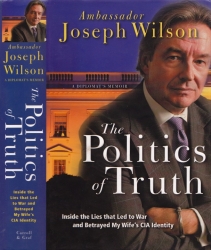
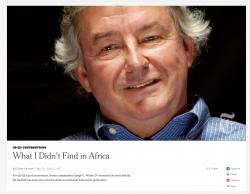
It is especially poignant that Joe died today, when the emergence of another whistleblower is having a seismic impact in the politics of the day. A fateful NY Times op-ed by Joe, “What I Didn’t Find in Africa,” blew the lid off the Bush administration’s falsification of intelligence before the Iraq War. It is galling to me that Dick Cheney is still alive, and Joe Wilson is dead, a cosmic injustice of the first order. Below is text of a blog post I published in 2013, when MSNBC broadcast a special program called “Hubris,” based on the book of the same name about the Iraq War by David Corn and Michael Isikoff. I took that occasion to write a post about working with Joe, and am happy to also share it below.
—–
I vividly recall how the Bush administration pushed the country, and as much of the world as it could hector along with them, into invading Iraq. It was a mad, misguided rush, one that I was upset about at the time, and soon after became involved with personally and professionally. In July 2003, after Valerie Plame’s role as a CIA official was revealed in an infamous column by Robert Novak, I contacted Ambassador Joseph C. Wilson IV, Plame’s husband. In the months before the invasion of Iraq, he had become a vocal critic of the rush to war, publishing a number of Op-Ed columns that drew on his experience of twenty-five years as an American diplomat, including his service as the last American official to meet with Saddam Hussein before the beginning of the Gulf War in 1991, and earlier, as a junior foreign service officer in Niger. In my role as an editorial executive with Carroll & Graf Publishers I was referred to Wilson by publishing friend, Barbara Monteiro. I contacted Joe and found he was interested in writing a book that would chronicle his years as an American foreign service officer; more recent events involving his fateful trip to Niger, where he was sent by the CIA to investigate the claim that Iraq had sought uranium yellowcake from that African country; and the unprecedented exposure of his wife’s CIA employment. Joe, as I soon came to know him, agreed to the offer I made, a contract was quickly signed, and he began working diligently on the manuscript.
Fortunately, when Joe retired from the State Department, a few years before the Iraq war fever, he had sat for a series of lengthy interviews with an interlocutor from State—a good custom at the government agency—setting his memories down in a proper oral history. He drew on this aide-memoir as he composed the diplomatic memoir that made up about 1/3 of the final manuscript. From the width of the spine in the attached shot of the book cover (designed by longtime Carroll & Graf colleague Linda Kosarin), you can tell it was a substantial volume, more than 500 pages, the heft aided by that oral history. As for his trip to Niger, the positions he took in opposition to the Bush administration while they were twisting intelligence and co-opting media during he run-up to the war, and events after the invasion, including the outing of his wife, he had little need of reminders. Joe delivered a very readable manuscript, and with a team of colleagues at Carroll & Graf we edited this draft on a crash schedule, and Joe quickly made key revisions to it, based on fast-moving events in the CIA leak controversy. Throughout, we kept a keen eye on breaking developments in the investigation in to how and why Valerie’s CIA employment had become a subject that administration officials felt free to discuss openly with reporters. Getting the manuscript ready for the printer was like aiming an arrow at a moving target.
The launch for the book, was in early May 2004, less than a year after Novak’s fateful column. Joe went on the TODAY show, Charlie Rose, and he did a ton of public radio shows. I went with him to many of those interviews, sat in green rooms with him, fancy and plain settings. It was as cool when he did Democracy Now with Amy Goodman, as when we went to Rockefeller Center one morning before 7 AM, to do the TODAY Show. His most interesting TV appearance was on “Countdown with Keith Olbermann,” when Keith shared with Joe and the audience White House talking points supposedly rebutting the book. These had been sent to virtually all news outlets, including even to programs like Countdown, ones that weren’t having any of the BS from the administration. Olbermann held up the sheaf of talking points and tossed the papers around his set, as mockery of the Bush administration. The book became a bestseller on the NY Times, Washington Post, and Publishers Weekly bestseller lists. With Joe’s opposition to the war, and most of all the fact he’d been to Niger and vigorously debunked the fraudulent yellowcake claim, Joe had stepped across a tripwire that loosed Dick Cheney and Scooter Libby like a pack of dogs, with Karl Rove and Ari Fleischer chasing close behind. None of their talking points actually refuted Joe’s claims. John Dean gave the book a great review in the New York Times Book Review and it became a national hardcover bestseller in the Times and Publishers Weekly for about six weeks. This was Dean’s opening paragraph:
“THIS is a riveting and all-engaging book. Not only does it provide context to yesterday’s headlines, and perhaps tomorrow’s, about the Iraq war and about our politics of personal destruction, but former Ambassador Joseph Wilson also tells captivating stories from his life as a foreign service officer with a long career fostering the development of African democracies, and gives us a behind-the-scenes blow-by-blow of the run-up to the 1991 Persian Gulf war. As the top American diplomat in Baghdad, Wilson was responsible for the embassy, its staff and the lives of other Americans in the region – not to mention the freeing of hostages in Kuwait. He goes on to relate his eye-to-eye encounter with the wily sociopath Saddam Hussein; his return home to be greeted as a ‘true American hero’ by President George H. W. Bush; his stint advising America’s top military commander in Europe; and his time as head of the African affairs desk of Bill Clinton’s National Security Council, where he assembled the president’s historic trip to Africa while the ”Starr inquisition” into the Monica Lewinsky affair developed. Along the way he fell in love with and married a C.I.A. covert operative – a ”’willowy blonde, resembling a young Grace Kelly.”’
I should add the book was also a plea for Americans to be actively engaged in their citizenship, and to be unafraid if it became necessary to call one’s government to account. In 2010 The Politics of Truth and Valerie’s 2008 book Fair Game: How a Top CIA Agent was Betrayed by Her Own Government, were jointly adapted for the feature film, “Fair Game,” with Sean Penn and Naomi Watts. I saw Joe and Valerie in NYC for a premiere reception and we have remained friends, more so than other authors I’ve published over the years. Joe and Valerie played a significant role in the events of our times, bringing the Bush administration before the judgment of history for its deceptions. I am proud of the role I had in bringing their story before the public. To read about other aspects of this case, especially the federal trial of Scooter Libby for his obstruction of justice, and the book I brought out in 2008, The United States v. I. Lewis Libby, along with Patrick Fitzgerald’s legacy as a federal prosecutor, please see this post.
*
Valerie Plame is currently a candidate in the Democratic primary campaign for the U.S. House of Representatives from New Mexico for the 2020 election and I have contributed to her effort.
**
In 2010, when Joe Wilson appeared at the NY Times Center for a panel discussion pegged to the 40th anniversary of the newspaper’s op-ed section, he invited me to come as his guest, and arranged so that I could share the green room with him, and the other panelists, Nora Ephron, Anna Deavere Smith, Roy Blount Jr., and Garrison Keillor. It was quite a heady night. Joe’s contribution to the Times op-ed page had come on July 4th weekend in 2003, with “What I Didn’t Find in Africa.” Here’s a NY Times video of Joe talking about how he came to write the op-ed.

